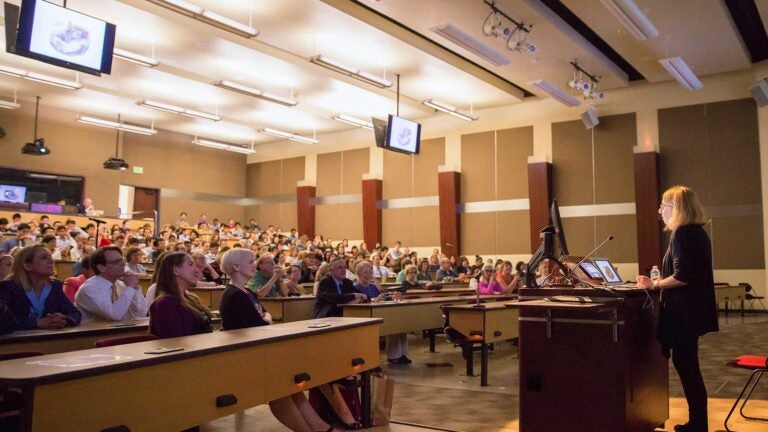
The New Yorker cartoonist Roz Chast talks about coping with loss. (Photo/Ricardo Carrasco III)
New Yorker cartoonist shares her story of caring for elderly parents
A book filled with hilarious and heartbreaking cartoons was Roz Chast’s way of processing what she learned about the end of life
Roz Chast hadn’t planned on drawing her mother after she died. The longtime New Yorker cartoonist had spent the past decade chronicling her parents’ final years, writing down their conversations and animating her parents’ everyday life. But by the time Elizabeth Chast died in 2009, she had stopped talking — so Roz Chast spent their last months together sketching her mother.
“When a person in a place like this [hospice] dies, all of this official stuff starts to happen — her companion had to get the hospice person, the hospice person had to get the head nurse, the head nurse had to do this, somebody calls the funeral home, everything starts to happen and I was just left with my mother for about 15 minutes,” Chast said, “and I thought, ‘this is the last time I’m going to see my mother,’ so I drew her.”
Chast shared those drawings and many more hilarious and heartbreaking cartoons from her memoir, Can’t We Talk About Something More Pleasant?, during a Visions and Voices event held March 30 on the Health Sciences Campus. The lecture was co-sponsored by the Keck School of Medicine of USC’s Program in Medical Humanities, Arts, and Ethics, the USC Pacific Center for Health Policy and Ethics, and the USC Levan Institute for Humanities and Ethics.
The book was Chast’s way of processing what she had learned about the end of life, a topic she and her parents, George and Elizabeth Chast, had dutifully avoided for decades. Chast said that in creating the book, she wanted to remember her parents: their mannerisms and expressions, the funny moments and the hard moments that come with caring for elderly parents with dementia.
I really felt like I wanted to be as upfront as I could be about the experience …
Roz Chast
The lecture included a discussion about the role of health professionals at the end of life, as she discussed her parents’ health decline and their slow acceptance of caregivers’ help.
“I really felt like I wanted to be as upfront as I could be about the experience and be honest about the terrible parts as well as the good parts,” Chast said. “This was what my parents were like; they were really unique. I just felt like, to sugarcoat everything would be more disrespectful to them.”



